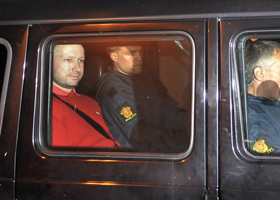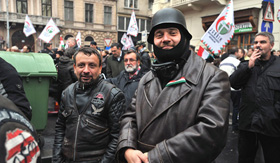In the 1990s and 2000s, European rightwing radicals became markedly more mainstream: with their operational range stretching from extremist crime to participation in governmental and parliamentary coalitions. Since the underlying factors in this Old World far-right remain intact, it seems an apposite moment to assess the potential limits on the expansion of this ideology. This article is an attempt to forecast the evolution dynamics of this rightwing phenomenon, and also suggests a typology of rightwing radical parties in view of their success within the political system.
The Extreme Right: The Road to Success
In Europe, ethnic-based unrest has become as common as the regular victories of far-right and rightwing populist parties, as European states attempt to deal with the consequences of the immigration boom. Paris in 2005, Brixton in 2011, and Amiens in 2012, the twofold popularity growth of Geert Wilders's Party for Freedom in Holland [1] and the Swedish Democrats [2], as well as the snowballing criticism of the “multicultural project” by European leaders [3] – all testifies to the long-term institutionalization of the ethno-political component in the current systemic crisis.
Notably, Europe has been heading towards this ethno-political collision for more than a decade. Back in the 1980s, the popularity of the French National Front skyrocketed - helping its candidate Jean-Marie Le Pen win about 15 percent of votes in his quest for presidency. In fact, the continent had been shuddered by race riots even earlier, just remember Great Britain in the late 1940s.
The most significant aspect of this upwards trend was the immigration boom of the 1950s-1970s that generated an ever-increasing inflow of migrants, who were seen as being alien to European values and were placed predominantly at the lower levels of the European social pyramid.
By the early 21st century, the number of legal, naturalized immigrants in the EU must have been between 45 and 50 million, with illegal incomers raising this figure to 60 million. That however could well be an underestimation [4].
The migrant communities that face the most significant challenges in adapting to European societal values are not exclusively drawn from developing countries. Immigrants from other regions, including other EU countries, often find adapting difficult. In 2008, Romania was the largest in-house migrant generator (384,000)[5], with Roma people traditionally accounting for a significant share of the total. From 2005 to now, about one million Roma have moved to Western Europe [6]. In socio-cultural perception terms, the established residents of the Old World equate them with immigrants from developing countries.
Attempts by European institutional and legal instruments to stem this wave of immigration have failed, due to the continuing need for migrant workers and the existing diasporas’ high growth rate.
As a result, Europe responded to this dynamically changing demographic structure by introducing multicultural ideology and practices into its political scene, to ensure the smooth integration of these new minorities into European society, in the belief that providing the migrants with a new identity would make adaptation less painful.
Nevertheless, this approach failed. Even after adopting new political identifiers, these new members of society often remain within their traditional socio-cultural model, whose day-to-day expression permanently provokes inter-group alienation within the polity. Hence, if the traditional modern nation-state project is predicated on the relative cultural homogeneity of the political system, and correlated inter-group alienation lines and interstate borders, in real life multiculturalism erects frontiers within the country – bringing about the demise modern nation-state’s demise.
The Far-Right and Traditional Parties' Crisis
It is this comprehension of the magnitude of the situation that is emerging that drives the Old World’s “indigenous” population increasingly into the European nationalist camp.
This dynamic is non-partisan, and involves the electorate of mainstream political parties across Europe.
Back in the 1970s-1980s, the leftwing electorate began its vigorous migration into the extreme-right camp, and by the late 1980s Le Pen's National Front had become France's main workers' party.
At about the same time, dilution of the rightwing discourse surfaced, as the presence of a powerful far-right competitor drove the rightwing establishment to radical rhetoric, disorientating its core electorate.
More than that, today, even the proponents of multiculturalism are inclined to acknowledge that these slogans are used not to guarantee rights but to preserve racial and gender inequality, as well as unfair practices and traditions [7]. As a result, multiculturalism is being compromised – not only among moderate right-wingers, but also among mainstream liberals. The growth of nationalist sentiments in Scandinavian countries and the Netherlands are the best proof to this statement.
In turn, those political parties that stick firm to multiculturalism make a target for nationalist aggression, as is vividly illustrated by the Breivik case, the Norwegian extremist who gunned down young people attending a leftist summer camp, he claims, in protest against multiculturalism.
Outlook: Stagnation or Expansion?
The prospects for Europe’s far-right can only be assessed through an analysis of the key algorithms that are intrinsic to their achievements. In a rough estimate, by now there seem to be three main variations.
1. Deep Beachhead
Entities such as the National Front in France, the Party of Freedom in Austria and the Netherlands, True Finns and Flemish Interest have attained substantial electoral success (10 to 30 percent), and have a visible presence in their countries' political establishments, occasionally imposing their discourse on the mainstream parties. This point is particularly relevant in the case of, where Flemish Interest is dominant. In France and Austria, the moderates also have to bear in mind the growing competitiveness of the extreme right paradigm, and adjust their attitudes accordingly if they are to retain electoral support.
Does this mean that the strong base within the establishment that exists today will allow the extreme right to capitalize on their success?
There are at least two factors restricting their expansion within the “systemic” political field.
First, we may already be witnessing a distinct decline in electoral support for the far-right, after their triumphant incursion into the establishment. To stay in power, the party leaders have to compromise with their coalition partners, sacrificing the purity of their original program. This split between the ideologues and the pragmatists is augmented by the inevitable disillusionment of the electorate. Both the Austrian Party of Freedom and its Dutch copycat are facing a drop (at least relative) in popularity during the second phase of their ascent to power. As a rule, this rollback is temporary, but it does create a certain barrier to their further expansion.
Within the establishment, the far-right base is also affected by the growing numbers of voters who are part of communities of incomers. For now, this political resource is not too potent – from 25 to 30 million naturalized immigrants (exact figure is difficult to ascertain) [8] generate a maximum of eight to 10 million votes, bearing in mind the high share of children and adolescents without voting rights. However, this group is no longer in the realms of “statistical error,” and its importance is likely to show consistent growth – in opposition to the rightists.
To this end, after penetrating the establishment, the far-right parties will either remain the junior partners within coalitions or become a meaningful opposition force.
Notably, neither scenario seems encouraging from the traditional parties’ perspective. They will have to either cooperate with the radicals (and in so doing, lose respectability – which the extremists gradually take on) or face criticism from the opposition.
The above algorithm is only partially relevant to internal political dynamics in Central and Eastern Europe, where the absence of a stable political establishment, and the dominance of a nation-state discourse that is atypical for Western Europe, combine to enable the relatively unhindered ingress of the far-right in domestic politics. The 2010 parliamentary elections in Hungary, in which the radical right won about 70 percent - is particularly illustrative here: the extreme-right party For a Better Hungary (16.7 percent) and the winning conservative right coalition (52.7 percent) shared a common rhetoric.
2. Threshold Parliamentary Representation
In some places – Scandinavia, Italy, Greece – the extreme right broke into their parliaments either as part of coalitions or autonomously, but their presence within the established political system remains shaky, at three to eight percent, depending on the country. The trend suggests they could grow in Northern Europe, although the rate of this growth is difficult to predict. Due to the particular nature of the country’s history, the far-right seems to be on the decline in Italy, while in Greece the situation hinges on the debt crisis and the policies pursued by the EU, making forecasting the future of the rightwing radicals nigh on impossible.
3. Fringe Entities
In Great Britain and Germany the rise of the far-right can be seen in the greater popularity and activity of non-parliamentary or semi-parliamentary structures such as the British National Party and National Democratic Party of Germany. However, their growth is practically indiscernible at a national parliamentary level, as in the radical right are institutionally separated from big politics, with no grounds to suggest that this situation will change in the near future.
Hence, Europe seems to lack the fundamental institutions for the ascent of these far-right sentiments to a higher level of legitimacy, as the most successful extreme right-wing parties have already won about one third of national electorates, reaching a certain ceiling within the existing political systems.
Nevertheless, the basic factors that came together to generate the rise of the extreme right in the 1990s and 2000s are now combining into an anti-immigrant consensus between a major portion of the establishment and the ever-growing grassroots.
Quite predictably, if these current trends continue, sooner or later the European institutions and values will cease to correspond to this growing perception of immigration as a problem that threatens the very existence of what has come to be viewed as the traditional European socium. From this viewpoint, the European political system is reminiscent of a boiler on fire with a poorly fitting cap. The European leaders will either extinguish the fire (although there is, to date, scant indication that this scenario is in the offing) or the boiler explodes - altering the basic political structure and value models underpinning European society.
1. From 5.9% in 2006 to 15.5% in 2010 and 10.1% in 2012
2. From 2.9% in 2006 to 5.7% in 2010
3. E. Mayorov. Multiculturalism in Germany is Dead //10/18/2010
Multiculturalism 'clearly' a failure: Sarkozy // National Post, 10.02.2011. Mode of access:(1 , 2)
Great Britain: David Cameron: Multiculturalism Has Failed, NewCa.com, 7.02.2011
4. Eurostat // Population and social conditions // Statistics in focus // 34/2011// 6.5% of the EU population are foreigners and 9.4% are born abroad. – Luxembourg, 2011, p.1; Eurostat//Population and social conditions // Statistics in focus // 24/2011// Acquisitions of citizenship on the rise in 2009. – Luxembourg, 2011, p.1
5. ibidem
6. Demoscope Weekly № 433 – 434, 6 – 19.09.2010
7. http://www.humanities.manchester.ac.uk/socialchange/research/social-change/summer-workshops/documents/sleepwalking.pdf
8.E. Khizhny. The Role of Immigration in Labor Structure of Western Europe // Western Europe Facing the Immigration Challenge. Moscow, pages 69-87; Eurostat//Population and social conditions // Statistics in focus // 24/2011// Acquisitions of citizenship on the rise in 2009. – Luxembourg, 2011, p.1








